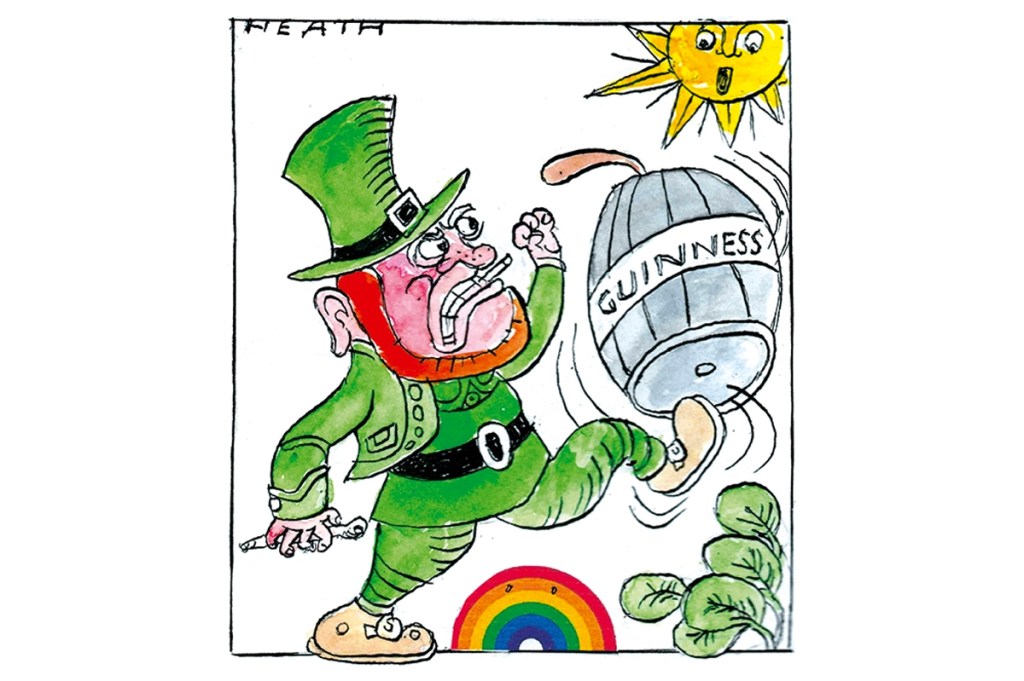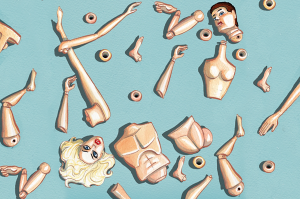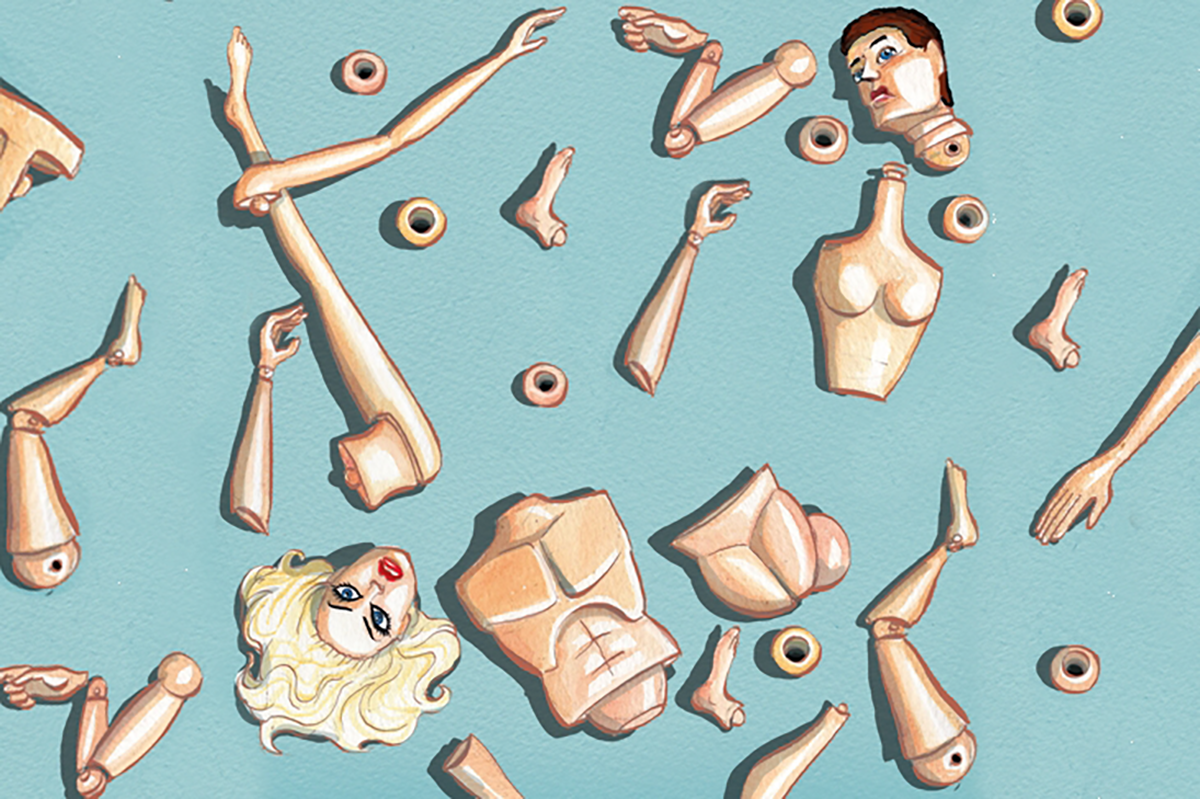So, which country is putting health warnings and calorie counts on bottles of alcohol for the benefit of its citizens? Nope, not Canada or New Zealand. But you’re getting warm…
It’s Ireland, the country that gave us Guinness, Jameson, Bushmills and, for those who like that kind of thing, Baileys. That’s right: a health warning just like for cigarettes. But instead of rotting lungs, presumably there’ll be a lovely picture of a liver with cirrhosis. What effect will it have on me? None, dear reader, none. I drink to forget this sort of thing.
But that’s the way Ireland is going (actually has gone) for a generation: not so much the nanny state as the Miss Trunchbull state, one that would swing you round by your pigtails. A proud drinking culture is reduced to reading the calorie count of a pint. The one hope is that Ireland may find it gets a frosty response from the European Commission for imposing trade barriers on, say, German beer.
It doesn’t really square with most people’s idea of Ireland, does it? The country of the fighting Irish, the drinking Irish, the self-deprecating humorous Irish, has turned into a kind of parody of liberal authoritarianism while you weren’t looking.
Mind you, there have been any number of indicators of the way things are going. At the Oscars ceremony, the host Jimmy Kimmel made an anodyne joke about the five Irish nominees, “which means the odds of another fight on stage just went way up.” Cue boos during the live screening at the Irish Film Institute, and Colin Farrell sounding off about it being racist.
But then, the country has acquired a thinness of skin lately which means taking exception to the possibility of anything related to Ireland being humorous. Leprechauns are a sensitive subject. The Evening Standard’s cartoonist Christian Adams drew a cartoon during the Boris Brexit negotiations showing the then British PM and Jeremy Hunt dressed as leprechauns next to a pot of gold and the words “No Backstop” — the gist being that this scenario was as likely as finding gold at the end of a rainbow. There was outrage on Irish social media. As Christian pointed out mildly, the joke was on the two Brits.
Cultural sensitivity can have its unintentionally funny side though. The Irish Times, bless it, ran a piece recently about the worrying cultural implications of fake tan (Irish women are addicted) — only to find, to its acute embarrassment, that the piece in question had been generated by AI rather than written by an Ecuadorian living in Dublin.
This is the paper that the comic genius Flann O’Brien wrote for. I’m not sure his satirical intelligence would go down well in a culture where Sally Rooney — who attempts “a realistic portrait of how people who are deeply concerned still manage to eke out some sort of existence” — is the national literary export. What would O’Brien have made of Wild Youth — Ireland’s ill-fated Eurovision entry — disowning its dance director for calling a trans woman involved in violence against a woman “a man,” among other tweets? I think he’d have given up on satire.
When I was growing up in pre-cool Ireland, the cardinal sin was to take yourself overly seriously. But contemporary Ireland takes itself and its shibboleths very seriously indeed.
I was at the Irish embassy media party when the then ambassador, Adrian O’Neill, was sounding off about Brexit in his speech. Joanna Bell, an Irish journalist working in London, piped up “Boring!,” the ambassador had an apoplexy and poor Joanna was frogmarched out of the embassy. A wittier Irish ambassador — Daniel Mulhall or Bobby McDonagh, say — might have laughed it off.
Irish humor once had a good deal to do with an exquisite sense of self-deprecation, a consciousness of the absurd, a relish of pomposity. I recall one exchange on the Late Late Show (an Irish chat show that everyone watched) between Terry Wogan and the host Gay Byrne which was a masterpiece of nuance, where they referred to Graham Norton as being a bit suspect on account of being Protestant (“one of them”) and carefully omitting any reference to sexuality. I wonder if you’d get away with it now.
The two men weren’t comedians, but they were much funnier than most of the current crop of Irish comedy men — Dara O’Briain, say. Derry Girls is funny, but that’s because it’s based on Derry in the 1990s, with angry Orangemen and a world-weary nun in a habit. As for Father Ted, another comic masterpiece, that was again from another era. In the Republic, if you wear clericals or a religious habit, you’re now likely to get abuse on the streets; in secular Ireland, anticlericalism is approved prejudice.
And if we’re talking about hate crime, there’s a bill heading for the statute books which should make the Irish civil liberties lobbies take to the barricades, except the Irish Council for Civil Liberties has, in fact, backed it.
The provisions are draconian, as Elon Musk has pointed out (“a massive attack on freedom of speech”). You’re barred not just from publicly expressing wrong sentiments about protected groups — gender, sexuality, ethnicity and trans self-identification — but banned from simply possessing off-message stuff on your devices, including memes. The police will be permitted to take away your laptop or phone or devices that may contain the offensive material (as defined by…whom? The alleged victim); they can enter your home and oblige you to log into your devices and if you refuse you may be up for a €5,000 ($5,380) fine or a year in prison. The fatuous justice minister, Simon Harris, was bragging in the Irish parliament that nearly 500 (well, 481) police are trained to deal with diversity-related hate speech. It would be less resented if they were as quick to deal with burglaries.
Trans issues are, as elsewhere, a reliable indicator of cultural conformity, and the new syllabus for sex education for younger high-school pupils is premised on the assumption that gender is a social construct. I don’t myself know anyone who’s thrilled about this. Irish universities are as trigger-happy on the trans issue as their British counterparts, with the difference that they don’t get called to account. The journalist Mary Kenny was canceled by the University of Limerick for her supposedly “transphobic” views. Trinity College Dublin, meanwhile, is renaming its Berkeley Library, called after the philosopher George Berkeley, who went to Trinity and also — yep — owned slaves.
Now, I can see what you might be thinking: welcome to our world. Hate crime; ideological conformity; cancel culture; it’s where we’re all at, no? Well, not quite. In larger societies, bigger nations, there’s more diversity of outlook. In Ireland, a small country, there’s marked cultural conformity. That’s true even when it comes to the spuriously inclusive policy-making instrument that is the Citizens’ Assembly, where the outcome of its deliberations can in practice be determined by deciding who chairs it and what the terms of reference are, to the entire satisfaction of the governing elite.
This article was originally published in The Spectator’s UK magazine. Subscribe to the World edition here.

























